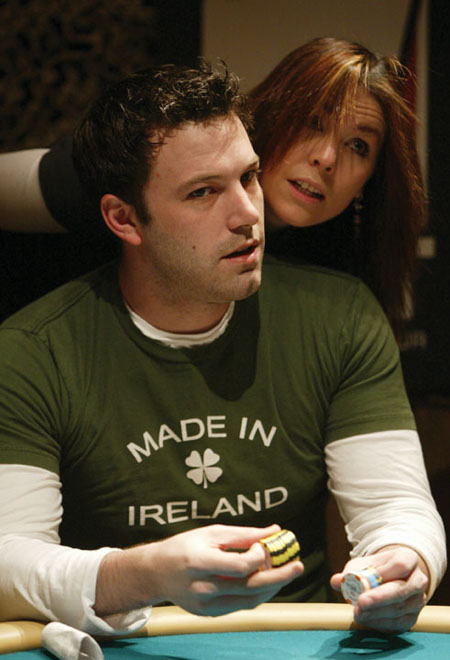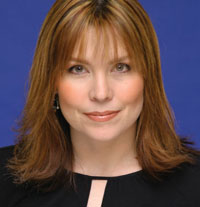|
|
 |
 |
 |
 |
|
FEATURESFlouting Convention, Part II: Annie Duke Finds Her Place at the Poker TableBy Dina Cheney ’99 Annie Duke ’87 doesn't play by the rules, unless they apply to poker. While her husband, Ben, stays at home to care for their four children, she works her "day job" as a professional poker player.
Duke is not just any poker player: She is the leading money winner among women in World Series of Poker history, having earned more than $650,000 in 25 finishes and 13 final tables, including $137,860 in this year's series. In fact, Duke - called "the best all-around woman poker player in the world today" by multiple poker World Series champion Phil Hellmuth Jr. - is so good that she only needs to play the game seven days out of the month. The remainder of the time, she consults for a company that develops poker software, makes media appearances and gets in a few parenting hours. So how did this poker prodigy, called "The Annie Legend," "The Duke" and "The Duchess of Poker," get started? Duke's father, writer and language expert Richard Lederer, taught English literature at Saint Paul's Prep School in New Hampshire. A star student, Duke was expected to attend an Ivy League university, specifically, Harvard. Instead, she chose Columbia to "break out of the mold" and be in New York City. "I applied early decision to Columbia so there would be no argument," Duke says. Although Duke flouted her family's expectations by attending Columbia, where she double-majored in English literature and psychology, she assumed that she'd follow in her father's footsteps and become a professor. While working as a research assistant for a psychology professor through the work-study program, Duke chose to pursue psycholinguistics, the study of how language is understood and interpreted and how and why the individual responds to discrete aspects of language. Acing her GREs, Duke applied to several graduate schools and decided on Penn. There, she studied and wrote her thesis on syntactic bootstrapping, or the hypothesis that children can use the knowledge of syntax to predict meanings of words. According to plan, Duke published papers, spoke at Stanford and MIT, and set up several job talks with NYU, Reed and Duke during a year when "no one was getting them." "I was very Type A about what I was doing," Duke notes. "My curriculum vitae was eight pages." Nevertheless, Duke was deeply confused: "I was undecided about what to do and was told that I was really good at this field and at grad school, so I just kept going." One month from defending her Ph.D. and the night before her job talk with NYU, Duke began throwing up. She was admitted to a hospital for extreme dehydration and remained there for two weeks. Afterward, Duke left the program, claiming that she'd return even though she knew she wouldn't. "I was a coward," she says. "I knew that I was letting a lot of people down. I had a National Science Fellowship, and those are hard to get. I felt such pressure to live up to the expectations that people had in terms of my quality as a student and a teacher." But Duke had been doing "the right thing" for too long. Her body couldn't have given her a clearer message that it was time to step off the academic track. But into what kind of future? Not knowing the answer, but sure about her love for Ben, whom she'd met and befriended while in graduate school, Duke proposed marriage. Ben said yes, and the couple moved to Montana, marrying a few months later, in 1992. Duke was 26. "We didn't know where to go and moved there because Ben's dad lived there. We had no money and no idea what to do. Yet, I'm a bit like Pollyanna. I always feel that things will work out." And work out they did, though it took a little bit of time. When Duke flew to Las Vegas to visit her brother, Howard Lederer - a two-time World Poker Tour champion and a two-time World Series of Poker bracelet holder - she tried her luck at the tables. Duke was no stranger to poker. She had played "silly versions" of the game at home when she was young: "My dad had a chip set, and we played a bit as a family. Cards were one of the only ways our family interacted." Duke played Texas Hold'em in a casino for the first time at 22. Soon, armed with some money and poker tips from her brother and books by poker expert David Sklansky, Duke began playing the game at Crystal Lounge in Billings, Mont., a bar with a legalized poker room downstairs. "It was very 1970s, with steep stairs and gross industrial carpet that hadn't been changed since the building was built. It was smoky and there were ranchers and Billings ne'er-do-wells who didn't like women, and I just sat down and started playing. I was the only woman, and I started making money right away. Five days a week, I would get there in the afternoon and play a few hours. There was a 45-minute commute each way. I treated it like a job."
After one successful year at the Crystal Lounge, Duke, on her brother's recommendation, entered four tournaments at the World Series of Poker in 1994. "Anyone can enter," she explains. "It costs $1,500." Referring to herself as "just a housewife from Montana," Duke placed 13th and third in the first two tournaments, cashing a total of $48,000. She then entered a third tournament, winning her way into the $10,000 championship event. Duke walked away from the series with almost $70,000 and, more importantly, the realization that poker could be a highly lucrative career. Duke's grasp of statistics, probability and math, as well as her ability to think quickly and work well under pressure, came in handy in the realm of poker. Explains Duke: "I'm also good at reading people and situations, trusting my instincts and bluffing. And my personality helps." Duke notes that a lot of men are aggravated by her aggressive style - and aggravation does not make for a skillful game. "I think women are better readers in general," she adds. "And men find women hard to read. My mere presence enrages them. Guys can be, on the whole, winning players, and when they come up against a woman, they can't help themselves. They can't stand to be beaten by a woman. It happens again and again. They just call, call, call, when they should be folding 75 percent of the time. On the other hand, I approach the game completely as a business. I do no other gambling. I don't let my emotions get in the way of how I play." Ever the pragmatic businesswoman, Duke says, "Most people are gambling a lot more when they put their money in the stock market than I am when I put my money on the poker table. I can put $50,000 in a pot on a bluff and not buy a shirt because it's $70 and costs too much. There's a mental separation between the money on the table and the money you pay your mortgage with." Armed with determination and confidence, Duke and her husband moved to Las Vegas, where they had their first child, Maud, now 9, in 1995. Without the normal intermediate steps through the low and medium stakes, Duke began playing high-stakes poker and continued winning. She says, "I started at the Mirage and risked about $3,000 per game, risking up to $25,000 per game within a year. I made a very good living my first year in Vegas. On average, I was playing poker 20 or 30 hours per week."
And what a living it is: Duke can earn $150,000 (or more) in a month. On her best day, she took home $300,000. On her worst, she lost $110,000. With those kinds of earnings, she'll definitely be able to achieve her goals of "earning a living, putting my kids through college and owning a nice home." Duke credits her husband with much of this success: "I couldn't do it if my husband wasn't so amazing. He really helps me accomplish what I want - even moving to Vegas to make things easier for me. And until you've moved from Montana to Las Vegas, you can't fathom what a sacrifice this was." In 1998, the couple had their second child, Leo, now 6, and, upon Ben's request, returned to Montana. "Every other month, for two weeks at a time, I would commute to Vegas with the baby, which was hard on us financially," Duke says. In May 2000, when she was 38 weeks pregnant with their third child, Lucy, now 3, Duke entered the World Poker Series championship event, where she came in 10th out of 512 entrants, the second-highest finish ever by a woman. Duke earned a cool $52,000 in the process - and gave birth two weeks later. In 2001, tired of the commute, Duke and her family returned to Las Vegas, where they remained until 2003. During those two years, Duke gave birth to the couple's fourth child, Nelly, now 2, and continued playing and winning. She also began consulting and serving as a celebrity spokesperson for Ielogic, a Portland, Ore.-based company that develops multiplayer online poker software (www.ultimatebet.com). In 2003, the family moved to Portland so Duke could step up her involvement with Ielogic. Now, seven days a month, she travels around the country for poker tournaments and promotion work in Los Angeles, which she considers a "difficult but good trade-off." The remainder of the time, she works in the Ielogic office, while her three older children attend school and her husband and babysitter watch Nelly. In her few down moments, Duke works on speculative TV and movie projects. "When I retire, I'm going to put up my feet and say, 'I haven't slept in 10 years,' " she says. "I pretty much work all of the time, spend time with the kids and sleep a couple of hours a night." Yet, despite her fame and success, Duke's children are her priority. "My kids fulfill my life," she says. "I'm proud of them because they breathe." When Duke had to choose between attending her daughter's sixth birthday party and participating in a game in Las Vegas that easily could have netted her a six-figure profit, she chose the former. "I didn't care what kind of money was at stake," she says. "I'm not missing that party. My brother said I could have paid for her college education that weekend. I said, 'You know what? When she's 25 and in therapy, she's going to be talking about how I missed her sixth birthday party.'" When it comes to Duke's commitment to her family, this poker champion won't fold. For more information, please visit www.annieduke.com.
|
|
|||||||||||||||||||||||||||||||||||||||||||||||||||||||||||||

